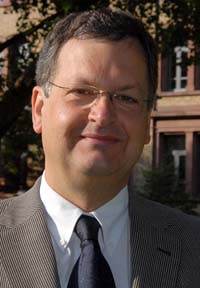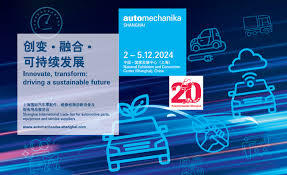
BASF Catalysts are world leaders in the development of several innovative technologies which are essential in the fight against global warming.
In June 2006 BASF Catalysts acquired Engelhard, a surface and materials science company. By combining the two companies’ expertise, BASF has become the world’s leading supplier of environmental and process catalysts.
Engelhard pioneered the development of the first catalytic converters between 1979 and 1980. The automotive catalytic converter is now a standard feature in more than 80 percent of new vehicles worldwide. The device is fitted to new buses, trucks and diesel vehicles throughout North America and Europe.
Automotive catalytic converters are made up of special combinations of precious metals such as platinum, palladium and rhodium. The process of conversion effectively reduces tailpipe emissions by up to 98 percent.
BASF Catalysts’ PremAir® is a catalytic coating for vehicle radiators. It reduces the amount of hazardous emissions already in the air by converting ozone into pure oxygen. Air filters based on this catalytic conversion technology are also installed in aircraft cabins to minimize the levels of ozone during flights. Catalytic converters installed in aircraft engines minimize the emission of residues such as carbon monoxide, unburned fuel and nitrogen oxides.
BASF Catalysts’ experts have also developed custom technical solutions for smaller applications such as lawn-mowers, chain-saws and motorbikes which are effective in reducing NOx and carbon dioxide emissions.
The catalysts developed by BASF have several industrial benefits which include producing fuels with less sulfur, obtaining more gasoline from a barrel of oil and speeding up chemical reactions. BASF catalyst technology is used by the petroleum refining industry to transform crude oil into gasoline, jet fuel and diesel fuel.
The company currently develops custom catalysts for several applications in the chemical processing industry and the plastic manufacturing industry. The catalyst technology helps to improve yields and lower manufacturing costs.
BASF is also a leading supplier of moisture control technologies and highly specialized temperature-sensing products. A number of industries including pharmaceutical, medical, military and aerospace utilize the moisture control technologies. The temperature-sensing products are used mainly in the electronics, semiconductor, aerospace, glass, plastics and rubber industries.
Automotive Industries spoke to BASF Catalysts Business Director, Dr. Eugene Kuijpers:
AI: At the end of 2006 you were fully integrated into BASF’s global operations. What are the benefits that the new organizational structure will bring to the customer?
Kuijpers: BASF formed the BASF Catalysts division in November 2006 by combining its existing global catalyst business with the catalyst operations of Engelhard Corporation, creating the world’s leading supplier of environmental and process catalysts. For our customers in the automotive industry our new organization offers expanded research and development capabilities to create high-performance, cost-effective emissions control technologies that draw on the core competencies of both organizations. We also have an expanded global presence and additional R&D and manufacturing resources to help our customers to be even more successful. Today, BASF Catalysts has the strongest catalyst R&D organization in the world, with over 600 scientists.
Other benefits the new organization enjoys includes the willingness of BASF to invest in long-term, strategic research programs, particularly in the catalyst area.
The BASF Catalysts Division supports BASF’s longstanding and deep commitment to deliver automotive solutions with performance, passion, and success. BASF is a leading-edge source of intelligent sustainable solutions to automotive manufacturers and their suppliers worldwide. With a full portfolio of technologies that include coatings, catalysts, engineering thermoplastics, polyurethanes, pigments and colorants, coolants and brake fluids for a broad array of exterior, interior, chassis and under-the-hood applications, BASF develops and delivers the innovations that help the automotive industry improve the quality, appearance, safety, cost competitiveness, performance, comfort, fuel efficiency, and sustainability.
AI: What is your position in the automotive market at present & where do you see the biggest potential for growth?
Kuijpers: BASF Catalysts is a leading provider of environmental catalysts for a range of applications and the leading supplier of catalysts for automotive catalytic converters. Areas of growth include diesel emissions control for both light- and heavy-duty vehicles and emerging regional markets, including China and India. We are well-positioned to take advantage of these growth opportunities from both a technological and geographical perspective. We offer advanced catalysts that enable diesel engine makers to cost-effectively comply with upcoming emissions regulations for passenger cars and larger vehicles. We operate state-of-the art development, testing and manufacturing facilities around the world that allow us to provide leading edge technology to our customers.
AI: What efforts do you make to provide your customers with high-performance, durable products to meet today and tomorrow‘s tough environmental regulations?
Kuijpers: BASF’s Environmental Catalysts business is supported by a world-class research and development organization that is led by a Global Catalysis Research Center in Iselin, New Jersey, U.S., and includes additional laboratories and engine testing facilities in strategic locations around the world. These resources are part of the BASF Research Verbund (“integrated whole†in German), headquartered in Ludwigshafen, Germany, which has over 8,000 researchers worldwide.
The Environmental Technologies group of BASF Catalysts leverages all these resources to develop products and technologies that enable cost-effective compliance with evolving emissions regulations. In addition, we collaborate with our automotive customers on development programs that are directly related to their applications and include testing performed on the final engine or vehicle in order to develop the best catalyst system with regard to performance and cost.
Our future success is based on remaining a technology leader, through continuous innovation to meet increasingly stringent environmental standards worldwide.
AI: Precious metals are critical to today’s high performance automotive catalysts. How do you help OEM’s to manage these expensive raw materials?
Kuijpers: BASF Catalysts offers customers material services to effectively source, recycle and manage risk and security for the precious metals that are vital to catalyst technologies. Our R&D efforts also focus on ways to use precious metals more efficiently in our specific catalyst products.
AI: How do you integrate your R & D, technical services and manufacturing operations around the world in order to provide the highest level of technology and service to the increasingly global automotive industry?
Kuijpers: Our R&D, technical service and manufacturing facilities are positioned close to major worldwide automotive manufacturing centers enabling us to provide high-levels of R&D, technical service and manufacturing services that are focused on the global needs of our automotive customers.
AI: Congratulations on your Qualitas Premium award from FIAT Auto. What were the main factors contributing to this excellent achievement?
Kuijpers: Our close collaboration with Fiat was a key factor enabling BASF Catalysts to achieve this award. We performed extensive engine testing with Fiat to engineer our catalyst solutions for their applications, including their 1.3 L diesel engine. This close working relationship enabled us to provide Fiat with high-performance and cost savings through a reduction in precious metals usage. We helped them achieve cost-effective regulatory compliance.
AI: The award was for support in product development and supplies. What were the biggest obstacles that you had to overcome?
Kuijpers: Today’s shortened development cycles present a challenge. We needed to complete extensive development and testing on a very short timeframe. Our Commercial Manager, Katrin Keinert, and her team, worked very closely with Fiat. This close collaboration, combined with our extensive experience, enabled us to meet their deadlines.
AI: What do you think will be the biggest challenges in terms of development and commercialization of advanced emissions catalysts for both gasoline and diesel powered cars in the next few years?
Kuijpers: Developers of environmental catalysts face several challenges in the coming years. More stringent diesel emission standards are taking effect around the world that require a high degree of NOx control. The challenge is to find the most cost-effective solution. Growth in automotive markets around the world will require us to continue to expand our global capabilities. Precious metal costs continue to challenge us to make the best use of these valuable materials and to help our customers manage them.
Challenge also means opportunity and BASF Catalysts, with the combined strength of Engelhard and BASF, is well-positioned to take advantage of the opportunities ahead.














More Stories
Shaping the future of the automotive industry at Automechanika Shanghai 2024 with the most fringe programme events and speakers yet
Some Ways How Motorists End Up in Collisions at U-Turns
Maximise Margins with Proven PPF Tactics